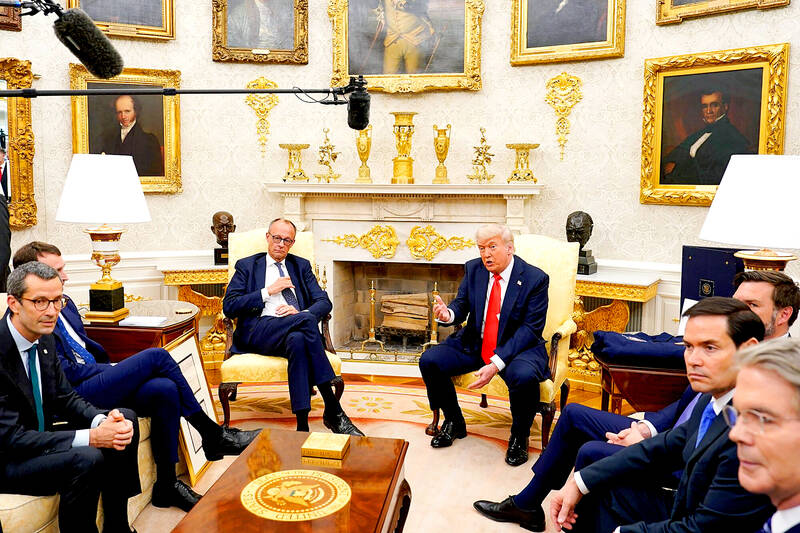US President Donald Trump on Thursday said that it might be better to let Ukraine and Russia “fight for a while” before pulling them apart and pursuing peace, even as Germany’s new chancellor appealed to him as the “key person in the world” who could halt the bloodshed by pressuring Russian President Vladimir Putin.
In an Oval Office meeting with German Chancellor Friedrich Merz, the US president likened the war in Ukraine, which Russia invaded in February 2022, to a fight between two children who hate each other.
Trump said that with children, “sometimes you’re better off letting them fight for a while and then pulling them apart,” adding that he relayed the analogy to Putin in a call this week.

Photo: Bloomberg
“I said, ‘president, maybe you’re going to have to keep fighting and suffering a lot,’ because both sides are suffering before you pull them apart, before they’re able to be pulled apart,” Trump said.
The comments were a detour from Trump’s often-stated appeals to stop the violence in Ukraine — and he again denounced the bloodshed Thursday even as he floated the possibility that the two countries should continue the war for a time.
Merz sidestepped Trump’s assertions and said that the US and Germany both agree on “how terrible this war is,” while making sure to lay blame squarely on Putin for the violence and make the point that Germany was siding with Ukraine.
“We are both looking for ways to stop it very soon,” Merz said. “I told the president before we came in that he is the key person in the world who can really do that now by putting pressure on Russia.”
Thursday’s meeting was the first time the two leaders sat down in person, and Merz left the public portion unscathed as he successfully avoided the kind of made-for-TV confrontation in the Oval Office that befell other world leaders such as Ukrainian President Volodymyr Zelenskiy and South African President Cyril Ramaphosa.
Merz gave Trump a gold-framed birth certificate of the US president’s grandfather, Friedrich Trump, who emigrated to the US from Kallstadt, Germany, and Trump called the chancellor a “very good man to deal with.”
“He’s difficult, I would say? Can I say that? It’s a positive. You wouldn’t want me to say you’re easy, right?” Trump said, gently ribbing Merz. “He’s a very great representative of Germany.”
Merz told German reporters after the White House meeting that he had invited Trump to visit Germany, “his home country,” and added that the two leaders “get along well on the personal level.”

NEXT GENERATION: The four plants in the Central Taiwan Science Park, designated Fab 25, would consist of four 1.4-nanometer wafer manufacturing plants, TSMC said Taiwan Semiconductor Manufacturing Co (TSMC, 台積電) plans to begin construction of four new plants later this year, with the aim to officially launch production of 2-nanometer semiconductor wafers by late 2028, Central Taiwan Science Park Bureau director-general Hsu Maw-shin (許茂新) said. Hsu made the announcement at an event on Friday evening celebrating the Central Taiwan Science Park’s 22nd anniversary. The second phase of the park’s expansion would commence with the initial construction of water detention ponds and other structures aimed at soil and water conservation, Hsu said. TSMC has officially leased the land, with the Central Taiwan Science Park having handed over the

AUKUS: The Australian Ambassador to the US said his country is working with the Pentagon and he is confident that submarine issues will be resolved Australian Ambassador to the US Kevin Rudd on Friday said that if Taiwan were to fall to China’s occupation, it would unleash China’s military capacities and capabilities more broadly. He also said his country is working with the Pentagon on the US Department of Defense’s review of the AUKUS submarine project and is confident that all issues raised will be resolved. Rudd, who served as Australian prime minister from 2007 to 2010 and for three months in 2013, made the remarks at the Aspen Security Forum in Colorado and stressed the longstanding US-Australia alliance and his close relationship with the US Undersecretary

‘WORLD WAR III’: Republican Representative Marjorie Taylor Greene said the aid would inflame tensions, but her amendment was rejected 421 votes against six The US House of Representatives on Friday passed the Department of Defense Appropriations Act for fiscal 2026, which includes US$500 million for Taiwan. The bill, which totals US$831.5 billion in discretionary spending, passed in a 221-209 vote. According to the bill, the funds for Taiwan would be administered by the US Defense Security Cooperation Agency and would remain available through Sept. 30, 2027, for the Taiwan Security Cooperation Initiative. The legislation authorizes the US Secretary of Defense, with the agreement of the US Secretary of State, to use the funds to assist Taiwan in procuring defense articles and services, and military training. Republican Representative

TAIWAN IS TAIWAN: US Representative Tom Tiffany said the amendment was not controversial, as ‘Taiwan is not — nor has it ever been — part of Communist China’ The US House of Representatives on Friday passed an amendment banning the US Department of Defense from creating, buying or displaying any map that shows Taiwan as part of the People’s Republic of China (PRC). The “Honest Maps” amendment was approved in a voice vote on Friday as part of the Department of Defense Appropriations Act for the 2026 fiscal year. The amendment prohibits using any funds from the act to create, buy or display maps that show Taiwan, Kinmen, Matsu, Penghu, Wuciou (烏坵), Green Island (綠島) or Orchid Island (Lanyu, 蘭嶼) as part of the PRC. The act includes US$831.5 billion in